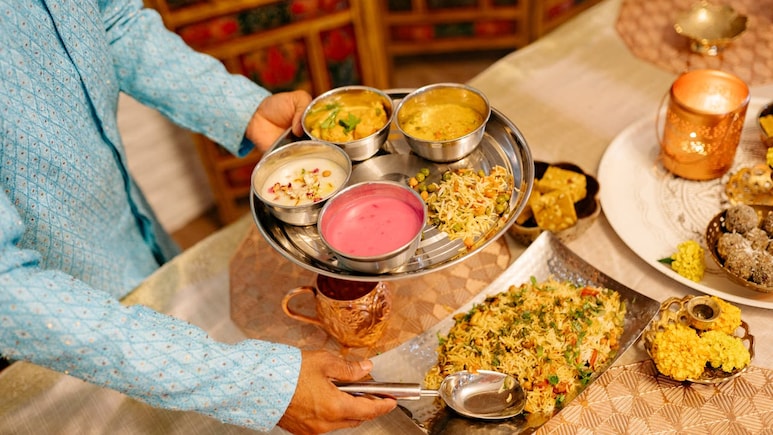
As the festive season lights up homes across India, it also brings with it a rhythm of restraint and indulgence, with fasting before festivals and feasting during celebrations. From Navratri fasts to Diwali feasts, many people swing between calorie control and overconsumption within days. While this ebb and flow may seem cultural and harmless, it actually triggers complex physiological responses within the body. According to Ms. Ruchika Jain, Unit Head Dietician at Fortis Vasant Kunj, this shift "places unique demands on our metabolism and digestion."
When we fast, the body enters an energy-conserving state, slowing down certain processes and heightening sensitivity to nutrients. But when the feasting begins, our systems face a sudden overload of heavy, calorie-dense foods. This abrupt transition can lead to digestive distress, fatigue, inflammation, and fluctuating blood sugar levels.
Understanding what's happening inside your body during this transition, and learning to balance traditional enjoyment with health awareness, can help you make mindful choices. Here's a closer look at what your body really endures during fasting and feasting, and how you can protect your health while still partaking in festive joy.
The Science Behind Fasting
Fasting, whether for spiritual or health reasons, triggers a natural state of metabolic adaptation. When you abstain from food for several hours, your body begins to use stored glucose for energy. Once these reserves run low, it starts breaking down fat for fuel, producing compounds known as ketones.
"This process can have short-term benefits such as improved insulin sensitivity, mild detoxification, and enhanced cell repair," explains Ms. Jain. "However, prolonged or poorly planned fasting can backfire, leading to fatigue, nutrient deficiencies, and muscle loss."
During long fasts, dehydration can also be a major risk. Especially in warm weather or during physically demanding days, limited fluid intake can reduce electrolyte balance, cause headaches, and impair digestion once you start eating again.
The Sudden Feasting Shock
Then comes the festival feast, a buffet of fried snacks, sweets soaked in syrup, heavy gravies, and sugary beverages. After fasting, your digestive system is more sensitive, and a sudden surge in calories, fat, and sugar can overwhelm it.
"When you suddenly introduce rich foods after a fasting period, your body may not produce digestive enzymes quickly enough to process them," says Ms. Jain. "This can lead to bloating, acidity, and indigestion."
Physiologically, your pancreas responds to the feast with a surge of insulin to manage the influx of glucose. The problem? This rapid rise and fall in blood sugar can cause energy crashes, mood swings, and a tendency to overeat.
The Gut And Inflammation Connection
Your gut microbiome, the trillions of beneficial bacteria living in your digestive tract, thrives on consistency. When you alternate between fasting and bingeing, it can disrupt this balance.
"Gut bacteria respond to what we eat," notes Ms. Jain. "Feasting on processed foods, sugar, and fried items can reduce the diversity of good bacteria, increase inflammation, and even affect immunity."
This inflammation doesn't just cause discomfort. Over time, it may contribute to chronic health issues like insulin resistance, weight gain, and high cholesterol.
The Emotional Impact Of Fasting And Feasting
Beyond the physical effects, the emotional and mental toll of dietary extremes is significant. Restrictive fasting can sometimes lead to irritability, anxiety, or food obsession, especially when followed by guilt-laden overeating.
"Food is central to celebration and community," says Ms. Jain. "But it's important not to let guilt or excess control that joy. The key is moderation, and not deprivation."
Practicing mindfulness while eating, such as slowing down to savour food and recognizing when you feel full, can help maintain balance.

Photo Credit: Pexels
How To Support Your Body During Festival Season
Experts recommend small, sustainable steps to enjoy the season without distressing your body:
- Break Your Fast Gently: Start with light, easy-to-digest foods like fruit, soup, or yogurt before moving on to heavier dishes.
- Stay Hydrated: Drink plenty of water, coconut water, or herbal teas to restore electrolytes and prevent bloating.
- Add Fibre and Protein: These nutrients help stabilize blood sugar levels and keep you fuller longer. Opt for nuts, pulses, lean meats, or paneer.
- Avoid Skipping Meals Before Feasts: Many people "save calories" before a big meal, which can lead to overeating later. Instead, eat small, balanced meals throughout the day.
- Watch Portion Sizes: Serve yourself small portions first; you can always go for seconds if you're truly hungry.
- Balance the Plate: Include salads or fruits alongside festive foods to increase fibre and antioxidants.
- Move a Little: Gentle activity, like a post-meal walk or light yoga, can improve digestion and prevent sluggishness.
Festival Foods That Can Be Healthy
Not all festive foods are harmful, it's often the preparation that matters. Choosing baked or air-fried snacks over deep-fried ones, or replacing refined sugar with natural sweeteners like dates or jaggery, can make a difference.
"For instance, roasted makhanas, dry fruit laddoos with minimal sugar, or homemade chaat with sprouts can all be nutritious festive options," suggests Ms. Jain. "It's about making simple swaps that don't compromise taste or tradition."
The festive season is a time to celebrate connection, tradition, and joy, not calorie anxiety. But understanding what your body experiences between fasting and feasting allows you to make choices that support your well-being. "Our bodies are resilient, but they also need care," concludes Ms. Jain. "Enjoy your favourite foods, but do so mindfully. The goal is not perfection, but balance to celebrate with your health intact."
As the lights, laughter, and aromas of the festive season fill the air, let's remember that nourishment is as much about how we eat as what we eat. Celebrate Diwali consciously, and let your health be the gift that lasts long after the festivities end.
Disclaimer: This content including advice provides generic information only. It is in no way a substitute for a qualified medical opinion. Always consult a specialist or your own doctor for more information. NDTV does not claim responsibility for this information.
Track Latest News Live on NDTV.com and get news updates from India and around the world

